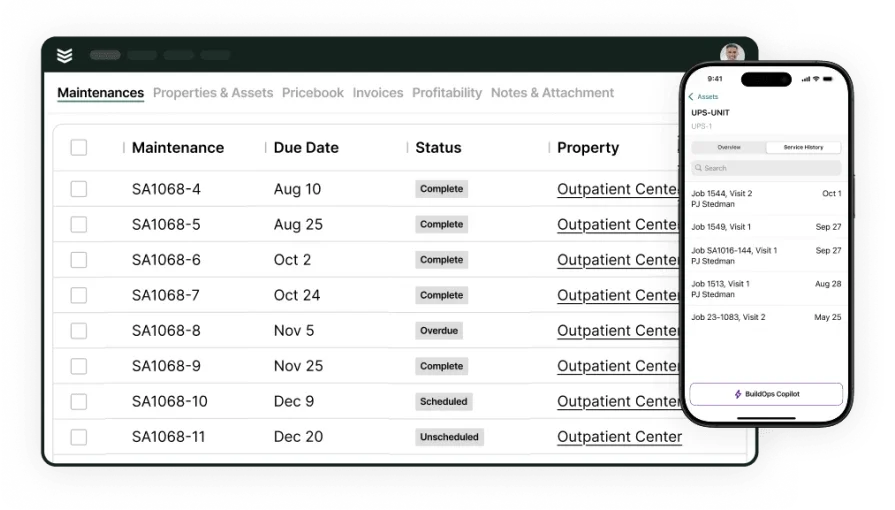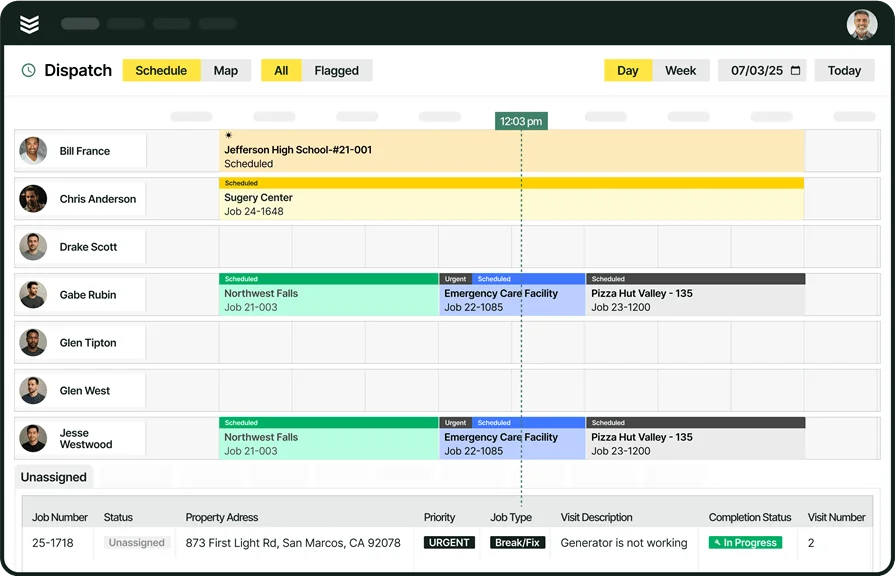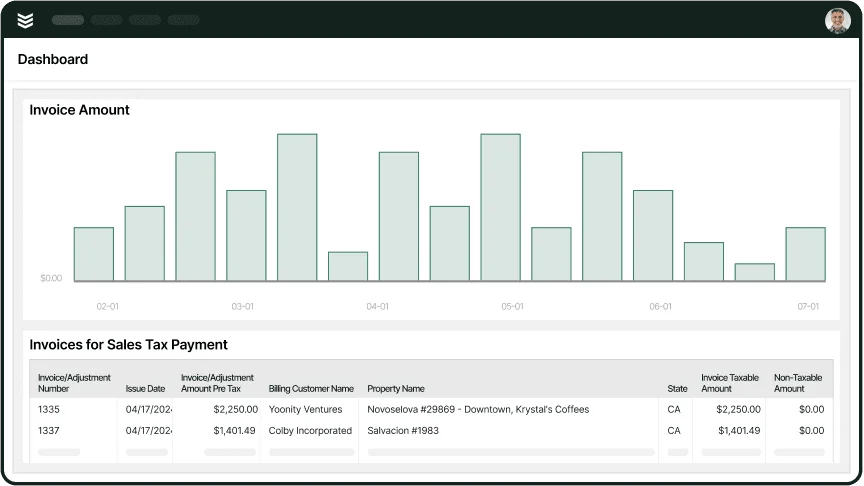Keeping field technicians productive and on schedule is no easy task. From last-minute job changes to equipment delays and miscommunication, even a small hiccup can throw off an entire day's work. The right field service technician software eliminates these challenges—ensuring techs get to the right job, with the right tools, and the right information, every time.
This guide breaks down everything you need to know about choosing the best field service technician software, including must-have features, top-rated solutions, and how to pick the best fit for your business.
- Choosing the best field service technician software
- 6 must-have features of a field technician software
- 7 best field service technician software options
- 7 key benefits of using field tech software
- 4 common questions about field service technician software
Finding the right solution can be overwhelming, especially with so many options on the market. The key is choosing a system that fits your workflow, keeps operations running smoothly, and supports technicians in the field without unnecessary complexity. Let’s break down what to look for when selecting the best field service technician software for your business.
Deep Dive
To learn more about how the right software can improve field operations, check out our full guide on field tech management software. It covers best practices and tools to help service teams work smarter, not harder.
Choosing the best field service technician software
A field service technician software should do more than just assign jobs—it needs to keep techs organized, ensure they have the tools and details to complete tasks efficiently, and streamline communication between the field and office. From scheduling and dispatching to work order tracking and customer updates, a well-built system helps eliminate delays, reduce manual work, and improve overall job performance.
But with so many options available, it’s important to choose one that aligns with your workflow. Here’s what to consider before making a decision:
- Scalability – Can the software keep up as your business grows? Will it support more technicians, job sites, and work orders without slowing down? If you manage teams across multiple locations, does it allow seamless coordination?
- Ease of use – How simple is it for technicians to access job details, update statuses, and complete tasks on the go? Can office staff quickly assign work orders and adjust schedules without unnecessary steps?
- Real-time updates – Does the system provide instant notifications for job changes? Can dispatchers track technician locations and job progress without constant back-and-forth calls?
- Automation & workflow management – Does it help optimize technician schedules, send customer reminders, and organize work history automatically? Or is it just a basic scheduling tool that requires too much manual input?
- Features – Beyond job scheduling, what else does it offer? Does it include asset tracking, invoicing, reporting, or integration with accounting and CRM systems?
Understanding what to look for is just the first step. Next, we’ll explore six essential features that keep field technicians efficient and operations running smoothly.
6 must-have features of a field technician software
Field service work is unpredictable. One minute, you're heading to a routine maintenance job, and the next, an emergency call throws off the entire day’s schedule. Without the right field service technician software, techs are left scrambling—tracking down job details, calling dispatch for updates, or arriving at a site unprepared. The right system ensures everything runs smoothly by keeping schedules organized, automating repetitive tasks, and giving technicians access to the information they need in real time.
Here are six essential features that make field service tech software a game-changer for businesses:
1. Real-time scheduling & dispatching
Managing schedules manually is a recipe for chaos—especially when jobs get rescheduled last minute. A field tech software with real-time scheduling and dispatching keeps everyone on the same page. Dispatchers can instantly assign jobs, update schedules, and ensure technicians receive real-time notifications when things change.
Now, think about this—an HVAC tech is en route to a scheduled maintenance job when an urgent repair request comes in from a hospital. Without a streamlined dispatch system, that job could be delayed for hours, impacting critical building systems. But with real-time scheduling for field service techs, the dispatcher can quickly reroute the nearest available technician while keeping the original job on track.
2. Mobile access for technicians
Field technicians don’t have time to call the office for job details or paperwork. A field service tech software with a mobile app allows them to access schedules, customer history, and job notes right from their phone or tablet. This eliminates unnecessary calls and ensures they show up fully prepared.
Here’s something every technician has dealt with—arriving at a job expecting one issue, only to find out the problem is something entirely different. An electrician, for example, might be called in for a simple panel upgrade, only to discover the wiring is outdated and needs replacement. With mobile access for field service technicians, they can pull up past service records, check inventory, and update the job scope instantly—no delays, no guesswork.
3. Automated work order management
Paperwork slows everything down. A field technician software with automated work orders streamlines the process by creating, updating, and storing job details digitally. Techs can log work progress, attach photos, and collect customer signatures all from one place.
Let’s say a plumbing contractor just wrapped up a leak repair in an office building. Without automation, they’d have to return to the office, fill out paperwork, and submit it for invoicing. That’s wasted time. With automated work orders for field service technicians, the technician updates the job status on their mobile device, attaches before-and-after photos, and sends a digital invoice—all before leaving the site.
4. Route optimization & GPS tracking
Wasted time on the road cuts into profits. A field service tech software with built-in GPS and route optimization helps techs get to jobs faster by factoring in real-time traffic and job priority.
Think about those days when traffic is at a standstill, and you have multiple jobs lined up across town. Without an efficient routing system, you’re stuck wasting time in transit instead of completing jobs. With GPS tracking for field service technicians, the system analyzes live traffic data and optimizes routes, ensuring you spend more time on-site and less time behind the wheel.
5. Integration with invoicing & payments
Getting paid quickly is just as important as completing the job. A field tech software that integrates invoicing and payment processing allows techs to generate invoices and collect payments on-site, reducing delays and administrative work.
Here’s a common scenario—an HVAC contractor finishes an installation and hands the client a paper invoice. The customer says they’ll "take care of it later," leading to delayed payments. But with integrated invoicing for field service technicians, the technician can generate a digital invoice immediately and offer on-the-spot payment options, keeping cash flow steady and eliminating unpaid jobs.
6. Customer management & communication tools
Keeping track of customer history and communication is critical for repeat business. A field technician software with CRM capabilities stores service records, automates follow-ups, and keeps client interactions organized.
Consider this—you're servicing a repeat client’s commercial refrigeration system, and they mention an ongoing issue with temperature inconsistencies. Instead of starting from scratch, you pull up their service history using customer management tools for field service techs. With all past work details at your fingertips, you can provide an informed solution on the spot, strengthening trust and ensuring long-term business.

Explore our service management suite
Equip your team with what they need to streamline operations and boost profits.
Other valuable field service technician software features to look for
Beyond the must-have tools, some extra features can make a field tech software even more powerful. These additions help teams work smarter, reduce admin headaches, and improve service quality.
- Service agreement tracking – Managing recurring jobs is easier with automated service agreements for field techs, allowing businesses to schedule maintenance visits, send reminders, and track contract terms effortlessly.
- Time tracking & payroll integration – With time tracking for field technicians, businesses can log hours accurately, simplify payroll, and eliminate manual timesheet errors.
- Performance reporting & analytics – Data-driven insights from reporting tools for field service techs help managers monitor job completion rates, identify bottlenecks, and make smarter business decisions.
These additional features may not be essential for every team, but they can significantly improve efficiency and profitability when used effectively.
7 best field service technician software options
Not all field technician software offers the same capabilities. Some platforms are tailored for small residential jobs, while others are built to handle large-scale commercial operations with multi-tech coordination and advanced job tracking. The best choice depends on factors like business size, job complexity, and how much automation is needed to keep field teams efficient.
Below, we break down the top field service tech software solutions and what makes each one stand out.
1. Best for commercial contractors: BuildOps
BuildOps is built exclusively for commercial field service businesses, offering an all-in-one management suite that integrates scheduling, dispatching, job tracking, and invoicing. Unlike generic field service tools, BuildOps is designed for contractors handling high-volume jobs, multi-tech teams, and complex service agreements.
With real-time job tracking, drag-and-drop scheduling, and automated work order management, BuildOps simplifies daily operations, ensuring the right techs are assigned to the right jobs—fully prepared and on time. Whether handling multi-day service projects, recurring maintenance contracts, or emergency repair calls, BuildOps keeps office teams and field technicians in sync.
How Pricing Works: BuildOps offers live demos every week, and you can request one anytime. This allows you to explore the platform’s full capabilities and determine if it’s the right fit for your business.
Features beyond job management:
- Full-service job tracking with real-time updates from the field
- Automated dispatching to assign the best technician for each job based on skill and location
- Built-in CRM to track customer history and service agreements
- Mobile app for technicians to access job details, upload photos, and capture signatures
- Integrated invoicing and payments to streamline billing and reduce paperwork
What sets it apart for commercial contractors: BuildOps isn’t just software—it’s a field service tech software designed to handle the unique needs of commercial contractors. Unlike residential-oriented tools, it seamlessly connects scheduling, dispatching, reporting, and customer management, giving field service businesses full visibility over their operations. Whether managing multi-site maintenance contracts, large-scale jobs, or emergency service requests, BuildOps helps contractors stay efficient and profitable.

Want to see how it works?
We’re built to handle complex workflows, large teams, and real-time job tracking.
2. Best for residential contractors: Housecall Pro
Image Source: Housecall Pro
Housecall Pro is a user-friendly field technician software designed for small to mid-sized residential service businesses. It simplifies job scheduling with a drag-and-drop calendar, automated appointment reminders, and invoicing tools, making it ideal for companies handling multiple small service calls daily.
For HVAC, plumbing, and electrical businesses that rely on repeat customers, Housecall Pro helps automate follow-ups, track service history, and streamline on-site payments. However, businesses with larger teams or complex workflows may find its capabilities limited.
How Pricing Works: Housecall Pro offers multiple pricing tiers based on business size and required features.
Features beyond job management:
- Automated reminders to reduce no-shows and improve customer communication
- Invoicing and payment processing to speed up collections
- Live GPS tracking to monitor technician locations
What sets it apart for residential contractors: Housecall Pro is built for small service teams that prioritize ease of use and efficiency. Its mobile-friendly design and automated workflows help residential contractors manage high call volumes without adding administrative overhead.
How it compares to BuildOps: Find out in our head-to-head comparison of Housecall Pro vs BuildOps features
3. Best for general contractors: Jobber
Image Source: Jobber
Jobber is a flexible field service tech software designed for general contractors who handle a mix of scheduled jobs and on-demand service calls. It simplifies dispatching, work order tracking, and invoicing, making it a great fit for businesses managing multiple job types across different industries.
While Jobber helps keep field technicians organized while ensuring customers receive timely service updates, businesses that require deep reporting and multi-location client management may need a more advanced solution.
How Pricing Works: Jobber offers tiered pricing based on team size and feature needs.
Features beyond job management:
- Client management tools to track service history and follow-ups
- Automated invoicing and on-the-go payment processing
- GPS-based job tracking to monitor technician locations
- Custom quoting tools to streamline job estimates
What sets it apart for general contractors: Jobber is ideal for contractors who need a simple yet powerful tool to manage day-to-day field operations. It balances ease of use with essential features like scheduling, invoicing, and client tracking, making it a strong choice for businesses handling diverse job types.
4. Best for nationwide service teams: ServicePower
Image Source: ServicePower
ServicePower is a field technician software built for companies managing operations across multiple regions. It provides intelligent job scheduling, AI-powered dispatching, and workforce tracking to ensure technicians are deployed efficiently, no matter where they’re needed.
For businesses with distributed teams, coordinating job assignments across different areas can be a logistical challenge. ServicePower helps streamline this by balancing workloads, reducing travel time, and ensuring the right technician is assigned to each job. While it excels at managing complex scheduling needs, smaller service teams may find its feature set more than they need.
How Pricing Works: ServicePower offers custom pricing based on business needs and team size.
Features beyond job management:
- AI-driven scheduling to optimize technician assignments
- Real-time GPS tracking for better workforce visibility
- Automated work order creation and dispatching
- Advanced reporting tools to analyze technician performance
What sets it apart for nationwide service teams: ServicePower is ideal for businesses that manage technicians across wide service areas. Its AI-powered scheduling ensures efficient dispatching, helping companies maximize coverage while reducing unnecessary travel time.
5. Best for trades with specialized workflows: FieldEdge
Image Source: FieldEdge
FieldEdge is a field tech software designed for contractors in HVAC, plumbing, electrical, and other skilled trades. It focuses on streamlining job tracking, customer management, and invoicing, making it a solid choice for trade-specific businesses that needan industry-tailored solution.
Unlike general field technician software, FieldEdge offers key tools for businesses handling specialized installations and repairs. However, companies outside the core trades may find its feature set too niche for their needs.
How Pricing Works: FieldEdge offers subscription-based pricing with different tiers based on team size and features.
Features beyond job management:
- Service agreement tracking to manage recurring maintenance work
- Integrated price books for flat-rate and time-based billing
- Equipment tracking to monitor service history and warranty details
- Mobile app for real-time technician updates and invoicing
What sets it apart for specialized trades: FieldEdge is built for skilled trade contractors who need more than just basic scheduling. With built-in price books, service agreements, and equipment tracking, it helps businesses in HVAC, plumbing, and electrical fields manage their operations with industry-specific tools.
6. Best for job costing and inventory management: Simpro
Image Source: Simpro
Simpro is a field tech software designed for businesses that need better control over job costing and inventory. It combines scheduling, material tracking, quoting, invoicing, and reporting, making it ideal for service teams that manage complex job estimates and supply usage.
For technicians working on projects that require detailed cost breakdowns and materials tracking, Simpro helps ensure every job stays profitable. But because of its extensive feature set, there may be a learning curve for businesses transitioning from simpler software.
How Pricing Works: Simpro offers tiered pricing based on business size and required features.
Features beyond job management:
- Inventory and material tracking to prevent stock shortages
- Automated quoting and invoicing for faster billing
- Job costing tools to track profitability on every project
- Cloud-based mobile access for technicians in the field
What sets it apart for job costing and inventory management: Simpro is ideal for businesses that need precise tracking of job costs and materials. With real-time cost analysis and inventory management tools, it helps service teams maintain profitability and efficiency.
How it compares to BuildOps: Check out our side-by-side feature breakdown of Simpro vs BuildOps
7. Best for enterprise-level service teams: Salesforce Field Service
Image Source: Salesforce
Salesforce Field Service is a field service tech software built for large service organizations that need advanced automation, AI-driven scheduling, and deep customer relationship management (CRM) integration. It’s best suited for businesses that already use Salesforce and want a seamless field service solution within their existing ecosystem. Salesforce Field Service connects technicians with dispatchers, tracks job performance, and automates customer communications, making large-scale operations more manageable. However, smaller teams may find it too complex or costly for their needs.
How Pricing Works: Salesforce Field Service operates on a per-user subscription model, with pricing based on the number of technicians and features required.
Features beyond job management:
- AI-powered job scheduling for complex service operations
- Integration with Salesforce CRM for full customer history access
- Mobile app with offline capabilities for technicians in remote areas
- Automated workflows to streamline service requests and follow-ups
What sets it apart for enterprise-level service teams: Salesforce Field Service is ideal for large organizations that need advanced automation and customer management tools. Its AI-driven scheduling and deep CRM integration make it a powerful solution for handling complex service operations at scale.

Get the software scoresheet
Compare leading tools at a glance with this easy-to-use scoresheet.
7 key benefits of using field tech software
For field technicians, efficiency is everything. Every delay—whether it’s missing job details, unclear schedules, or miscommunication—means wasted time and frustrated customers. The best field technician software eliminates these bottlenecks, helping techs complete jobs faster, improve accuracy, and stay connected to the office without the hassle of endless phone calls and paperwork. Here are seven key benefits that directly impact field technicians in their day-to-day operations.
1. Faster job completion with better workflows
When technicians don’t have to juggle paperwork or constantly check in with the office, they can focus on getting the job done. A field tech software streamlines workflows by centralizing job details, automating status updates, and reducing back-and-forth communication.
Consider a technician handling multiple service calls in a single shift. Instead of manually tracking job progress or waiting for assignments, they receive instant updates, access work orders digitally, and move seamlessly from one task to the next. Field service management solutions ensure that jobs flow efficiently from dispatch to completion without unnecessary delays.
2. Real-time job visibility for technicians
Field technicians work best when they have full visibility into their schedules, job details, and service history—all in one place. Without it, they risk showing up unprepared or missing critical job updates.
Imagine arriving at a job site only to realize the required parts weren’t ordered, or the customer provided new details that weren’t relayed. With a field service dashboard, technicians can track live job progress, update statuses, and access real-time information to stay fully prepared. Field service dashboards give techs instant access to the data they need to complete work efficiently.
3. Reduced administrative work for technicians
No one becomes a field technician to spend hours filling out forms or chasing down paperwork. With an automated field technician software, techs can log job updates, track hours, and generate reports without the burden of manual data entry.
Think about the end of a long workday—without automation, a technician might spend an extra hour logging details from completed jobs. With digital reporting tools, they can simply check off tasks, attach photos, and submit work summaries from their mobile device in minutes. Field service reporting ensures that job records are accurate and up to date, without adding extra admin work.
4. Fewer scheduling conflicts and miscommunications
A technician’s worst nightmare is showing up to a job that was double-booked, scheduled incorrectly, or missing key details. Without a structured scheduling system, these issues happen far too often, leading to frustration and lost time.
By implementing a field service tech software, scheduling becomes more dynamic—technicians are assigned jobs based on skillset, availability, and location. This ensures that every assignment is clear and no time is wasted sorting out miscommunications.
5. Increased first-time fix rates
Showing up at a job site only to realize you don’t have the right tools, parts, or background information can mean multiple trips and frustrated customers. A field technician software minimizes repeat visits by ensuring techs have complete job details before they arrive.
For example, a refrigeration technician heading to a repair call can see past service history, diagnostic reports, and even customer notes beforehand. This allows them to bring the necessary parts and tools, increasing the chances of fixing the issue on the first visit.
6. More accountability with performance tracking
Tracking technician performance isn’t just about monitoring—it’s about improving efficiency and rewarding top performers. A field tech software helps identify where time is spent, how long jobs take, and what areas need improvement.
Say two technicians handle similar workloads, but one consistently finishes jobs 30% faster. By analyzing field service metrics and KPIs, businesses can pinpoint best practices, provide additional training where needed, and optimize job assignments based on real performance data.
7. Improved customer satisfaction and reviews
When technicians arrive on time, complete jobs efficiently, and communicate effectively, customers notice. Field tech software plays a direct role in improving customer experience by reducing delays, ensuring accurate billing, and enabling better communication.
For instance, automated appointment reminders keep customers informed, while real-time status updates prevent misunderstandings. When service runs smoothly, happy customers leave positive reviews and are more likely to book future services.
4 common questions about field service technician software
Choosing the best field technician software can feel overwhelming, especially with so many options available. To help, we’ve answered some of the most frequently asked questions field service teams have when considering a new system.
1. What is field service technician software?
Field service tech software is a tool that streamlines scheduling, dispatching, job tracking, and reporting. It also provides real-time communication between technicians and office staff. With this, techs can receive job updates, log work details, and even process invoices on their phone or tablet.
2. How does field service technician software improve efficiency?
A field service tech software eliminates time-consuming manual tasks by automating scheduling, dispatching, job tracking, and reporting. It keeps technicians informed with real-time updates, ensuring they have the right information and tools before arriving on-site. This reduces delays, improves first-time fix rates, and helps teams complete more jobs in less time.
3. Can field technicians use this software on mobile devices?
Yes. Most field technician software includes a mobile app that allows techs to access job details, update work orders, and communicate with dispatchers from anywhere. Mobile access ensures technicians stay connected, eliminating unnecessary trips back to the office to collect paperwork or receive job assignments.
4. Does field service tech software help with customer communication?
Absolutely. Many platforms offer automated appointment reminders, real-time job status updates, and digital invoicing, keeping customers informed throughout the service process. This reduces miscommunication, prevents missed appointments, and improves overall customer satisfaction.
The right field service technician software is about keeping technicians productive, reducing delays, and ensuring every service call runs as smoothly as possible. Whether you’re managing a small team handling residential jobs or a large operation with technicians spread across multiple locations, having the right platform in place makes all the difference.
From real-time scheduling and mobile access to automated job tracking and invoicing, the best field tech software gives technicians the tools they need to work efficiently in the field. While some platforms cater to specific industries or business sizes, others, like BuildOps, provide an all-in-one solution designed specifically for commercial field service operations.
No matter the size of your team, investing in the right software helps eliminate bottlenecks, improve first-time fix rates, and create a seamless connection between the office and the field. Choosing a system that fits your workflow ensures your technicians stay focused on the job—not on chasing down paperwork or calling in for updates.

Take a closer look at BuildOps
Get an all-in-one platform that manages scheduling, dispatching, and invoicing.









